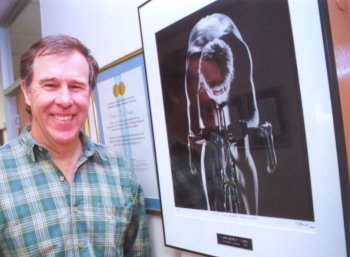When you're not thirsty, don't drink
02 June 2002
The naked truth: Professor Tim Noakes won a black and white photograph of Canadian Olympic cyclist Lynne Bessette for his straight-talking presentations at the Canadian Association of Sports Medicine (CASM) conference earlier this year.
SPORTS science pundit Professor Tim Noakes caused an award-winning stir at this year's Canadian Association of Sports Medicine (CASM) Conference where he delivered two lectures on the most recent – and controversial – findings on sports science, presentations which earned him the Best Speaker honour at the gathering.
Noakes' talks on, firstly, the theory that the brain regulates exercise performance and, secondly, on the occurrence of over-drinking during exercise, caused some upheaval, challenging some "age-old" orthodoxies of sports science. So impressed were delegates, however, that they selected him for the Best Speaker award at the event, hosted in March at the Mont Tremblant Ski Resort just outside Montreal.
The first non-Canadian to present the colloquium's Richard Lance Keynote Lecture, named after the late orthopaedic sports medicine specialist who became one of the first presidents of CASM, Noakes dealt with the idea of the body as a homeostat with the brain as the control centre. According to this model, the brain monitors information that it receives from the body's organs, integrates it and then calculates a suitable response that ensures the body's survival, explains Noakes.
"The response is the rate at which you do work, i.e. the speed at which you exercise. The body chooses, in a race for example, the top speed that you can sustain without harming it.
"We speculate that the sensation of fatigue is a measure of the brain's effort to maintain homeostasis in all the different bodily systems at that particular pace. So, the more difficult the brain finds it to maintain homeostasis, the more tired you will feel."
In his second talk, Noakes spoke about fluid balance during exercise and addressed specifically the problem on how much to drink during exercise. It's on this topic that he has regularly locked horns with the American College of Sports Medicine (ACSM), who hold that athletes must drink as much as possible during exercise.
This advice, says Noakes, is based on good science done in unphysiological conditions in a laboratory that does not relate to exercise out-of-doors. "In the field, we've never been able to show that people who are more dehydrated are at greater risk of damaging their health during competition. In fact, in many of the races we study, the most dehydrated athletes are usually the race winners."
The San Diego and Houston marathons in the United States have experienced "an absolute epidemic of this condition of water intoxication" over the past few years, while a woman died in the recent Boston Marathon because of this condition, says Noakes. Thanks to recommendations by local experts – "drink only when thirsty" – such incidents are never seen in South African standard marathons, and if they do still occur, only rarely during ultra-distance events (lasting eight to nine hours), he adds.
"When you're not thirsty, don't drink," is Noakes' succinct counsel.
As reward for his oratory skills, Noakes was allowed to select, under the watchful eye of his better half, one of a valuable series of photographs of members of the Canadian 2000 Sydney Olympic team, artistically snapped in the company of their sporting equipment Рbut sans their clothes Рby noted Canadian photographer, Jean-Fran̤ois B̩rub̩. Noakes and his wife opted for the picture of road cyclist, Lynne Bessette.
Noakes will pick up another award when he returns to Cannes shortly for this year's International Symposium on Water, where he was honoured last year with the Cannes International Prize for Water and Medicine Research for his work on sports-induced hyponatremia, the direct result of athletes being told to drink as much as possible.
- Tim Noakes is the Discovery Health professor of exercise and sports science at UCT in the UCT Department of Human Biology and is co-founder of the Sports Science Institute of South Africa.
 This work is licensed under a Creative Commons Attribution-NoDerivatives 4.0 International License.
This work is licensed under a Creative Commons Attribution-NoDerivatives 4.0 International License.
Please view the republishing articles page for more information.
Related
Alderman Owen Kinahan (1955–2026)
06 Jan 2026
Celebrating UCT’s outstanding Thuthuka results
29 Dec 2025
Looted African belongings must be returned
29 Dec 2025
Republished










